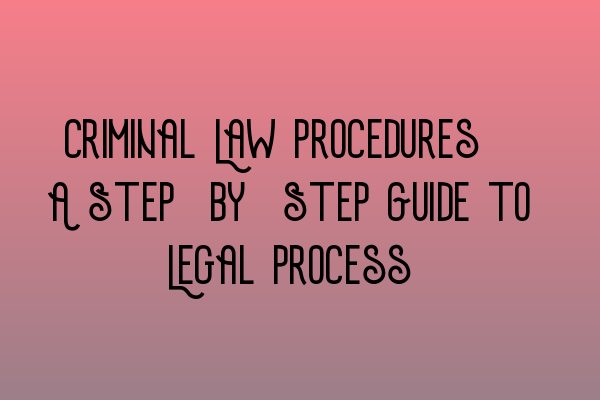Criminal Law Procedures: A Step-by-Step Guide to Legal Process
As a leading solicitor at SQE Criminal Law & Practice Law UK, I understand that navigating the legal process can be overwhelming and confusing, especially when it comes to criminal law procedures. That’s why I’ve put together this comprehensive step-by-step guide to help you understand the legal process involved in criminal law cases. Whether you’re a law student, a legal professional, or someone who simply wants to gain a better understanding of criminal law, this guide is for you.
1. Arrest
The first step in the criminal law process is the arrest. This occurs when a person is taken into custody by law enforcement officers for suspicion of committing a crime. During the arrest, the individual’s rights, such as the right to remain silent and the right to an attorney, must be read to them. Understanding your rights during an arrest is crucial, and this SQE 1 Preparation Course can provide you with invaluable knowledge and guidance.
2. Charging
After the arrest, the individual may be charged with one or more crimes. This involves the prosecutor filing formal charges against the accused. The charging decision is based on the evidence gathered by law enforcement during their investigation. If you’re interested in understanding the process of charging and how it affects the outcome of a criminal case, our SQE 1 Practice Mocks FLK1 FLK2 can help you gain a deeper insight.
3. Bail Hearing
If the accused is eligible for release before the trial, they may have a bail hearing. This is a proceeding in which the court determines whether the individual should be granted bail, or if they pose a flight risk or a danger to the community. Being prepared for a bail hearing is essential, and our SQE 2 Preparation Courses can equip you with the knowledge and skills needed to navigate this process successfully.
4. Plea Bargaining
In some cases, the prosecution and the defense may engage in plea bargaining. This is a negotiation process where the accused agrees to plead guilty in exchange for a lesser charge or a reduced sentence. Plea bargaining is a common practice in criminal law, and understanding its intricacies can significantly impact the outcome of a case. If you want to test your knowledge on plea bargaining, try out our SQE 1 Practice Exam Questions.
5. Trial
If a plea bargain is not reached, the case proceeds to trial. During the trial, both the prosecution and the defense present their evidence, call witnesses, and make their arguments before a judge or a jury. Trials can be complex and require a deep understanding of the rules of evidence and courtroom procedures. Preparing for a trial is crucial, and our SQE 1 Preparation Courses provide comprehensive training to help you excel in this area.
6. Sentencing
After the trial, if the accused is found guilty, the court proceeds to sentencing. This is the stage where the judge determines the appropriate punishment or penalty. Sentencing can vary widely depending on the nature and severity of the crime committed. Understanding the factors that influence sentencing decisions is crucial, and our expert solicitors at SQE Criminal Law & Practice Law UK can provide you with the guidance and assistance you need.
7. Appeals
In certain circumstances, the convicted individual may have the right to appeal their conviction or sentence. Appeals are based on a legal error or new evidence that may surface after the trial. The appeals process can be complex and time-consuming, but with the right legal representation, you can navigate it successfully. Reach out to our team of experienced solicitors at SQE Criminal Law & Practice Law UK for expert assistance in navigating the appeals process.
Conclusion
Navigating the legal process can be challenging, especially in criminal law cases. Understanding each step of the process is essential to protect your rights and achieve the best possible outcome. Whether you’re a law student, a legal professional, or an individual seeking knowledge about criminal law, our team of dedicated solicitors at SQE Criminal Law & Practice Law UK is here to assist you. Contact us today to learn more about our services and how we can help you effectively navigate the criminal law process.
For more information on related topics such as exam dates for the SRA SQE exams, or to access SQE 1 and SQE 2 preparation materials, please visit the following links:
– SRA SQE Exam Dates
– SQE 1 Preparation Courses
– SQE 2 Preparation Courses
– SQE 1 Practice Mocks FLK1 FLK2
– SQE 1 Practice Exam Questions
Remember, knowledge is power when it comes to criminal law procedures. Equip yourself with the necessary tools and resources to navigate the legal process confidently and effectively.
